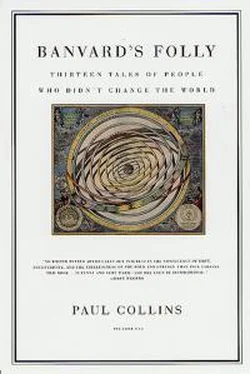Bacon was ecstatic: her greatest achievement was now within her grasp. She made a pilgrimage up to Concord, where she at last met her mentor Emerson in person and spent an evening conferring in his study. He nodded sagely in his rocking chair as she talked.
"I should give the inductions first," he emphasized again, "and then clinch them with your facts."
"I find the internal evidence more convincing," she insisted. But she admitted, "Of course I am certain I shall find historical proof in England.
But, even if I do not, I have already sufficient basis to make the theory at least respectable. In fact, sir, I believe it is irresistible, to a candid mind."
Emerson was delighted at her plans to travel to England. He wrote her a clutch of letters of introduction, including one to his old friend Thomas Carlyle.
These recipients were carefully chosen, and would open the doors for Delia to the intellectual life of her new country, and to every major archive in London. Now all she had to do was step through these doors.
On May 14 1853, Delia Bacon left New York Harbor on the Pacific, a steamer bound for Liverpool.
One of her first stops on the way to London was Stratford-on-Avon, the final resting place of "that wretched player," as she called him, "of the sordid play house." She stood in front of Shakespeare's grave in the Church of the Holy Trinity. The wretched player's tomb was certainly gaudy enough, as graves go; while other old tombstones from the time carry chilling messages like
Hodie mihi, cras tibi ("Today me, tomorrow you"--a spiteful epitaph if there ever was one), the great Bard's monument features a tarted-up painted bust and this odd little burst of doggerel:
Good friend, for Jesus' sake forbeare, To dig the dust enclosed here, Blest be the man that spares these stones; And cursed be he that moves my bones.
Shakespeare, it seemed, was anticipating his visitor--but foolishly failed to extend his curse to women. For Delia Bacon was indeed thinking of doing just such a thing: if Raleigh, Spenser, and Francis Bacon had formed a sort of literary cabal, what better place to hide a confession of their ghostwritten deeds than clasped in the hands of their dead spokesman? But now, amid all these reverent church visitors, was not the time to whip out the spade and crowbar--that would have to wait until later.
Arriving in London shortly afterward, Bacon found lodgings and sent Emerson's letter of introduction to the great essayist Thomas Carlyle. The letter gave Carlyle no clue to what he was in for, only said that his visitor had a certain theory on Shakespeare. Ah--but what decent writer didn't? Carlyle invited her over for scones and tea one summer day.
There, in his sitting room, she calmly explained her theory. Francis Bacon in particular fascinated her--his Novum Organum had helped to usher in the Age of Reason with its emphasis on scientific method and its underlying skeptical view of cant and unquestioned authority. The political implications of such freethinking were obvious, and dangerous--and they could only be baldly expressed in the history plays of Shakespeare, in which monarchs become less divinely ordained rulers than a tragic collection of human failings. That was why the leading writers of the time had to resort to a doggish hack, suspected by no one of deep thoughts, as their outlet for such revolutionary work.
Carlyle raised his eyebrows.
"Do you mean to say that Ben Jonson, and Heminge and Condell, and all the Shakespearean scholars since, are wrong about the authorship, and you are going to set them right?"
"I am. And as much as I respect you, Mr. Carlyle, I must tell you that you do not know what is really in the plays if you believe that that booby wrote them."
Carlyle began to whoop with laughter. "You could have heard him a mile," Bacon later wrote. But once he recovered his composure, he set out for her what she must do to complete her task--she must, by all means, go to the British Museum, and have a look at the Harleian manuscript collection. Hard evidence, he emphasized, was "worth all the reasoning in the world."
After his guest left he could only shake his head at the folly of what she was undertaking. Writing to Emerson, Carlyle lamented: I have not in my life seen anything so tragically quixotic as her Shakespere enterprise; alas, alas, there can be nothing but sorrow, toil and utter disappointment in it for her! ... There is not the least possibility of truth in the notion she has taken up; and the hope of ever proving it, or finding the least document that countenances it, is equal to that of vanquishing the windmills by stroke of lance.
Delia Bacon, in turn, was just as skeptical of Carlyle. She had politely accepted his advice about library research, but she did not follow it. She never made a single visit to the great library; her letters of introduction to
the librarians at the British Museum remained sealed. Her one major outing was to the grave of Francis Bacon. Though not actually related to him, she might be able to talk her way into seeing inside his grave, where she thought she would find some papers confessing to the plays. But it was no use: she could not persuade the graveyard beadle to open the tomb.
It did not really matter. She had already decided that she would prove her case on internal evidence, rather than the external evidence of historical documentation. All the proof of authorship needed was within the plays themselves, which--like the vast, lonely world around her--were a metaphorical cipher stretching into infinity.
The next two years were a profoundly isolated time for Bacon, spent shut in her quarters reading the plays over and over again-especially King Lear, Macbeth, and Coriolanus. Butler had given her money for only one year abroad, but she had no wish to return home. She belonged here, in London, where she would pursue unceasingly the great riddle-The Shakespere Problem Solved, she wrote at the bottom of one manuscript, underlining it twice. The manuscript grew, and grew--becoming two, three times as long as it was ever meant to be.
She could not stop writing.
She dined on crusts, fell behind on rent, lived with scarcely any coals to warm her little lodgings. When the winters grew cold, she wrote in bed, blankets piled over her; it was too cold to write at her desk. She did not speak to anyone--not even her old classmate Harriet Beecher Stowe, who was being regaled about London for her hugely successful Uncle Tom's Cabin.
Bacon's own fortunes could scarcely have been more the opposite. Despite entreaties by Emerson and Carlyle, one publisher after another in the United States and the United Kingdom rejected her proposed book.
But eventually Emerson managed to land her an offer for a series of articles in Putnam's Magazine. Her debut, published in a January 1856 issue, was a slashing attack on the idolatry that surrounded the Bard. The absence of a substantial historical record of the life of this "poor peasant" was almost proof enough to her:
The two or three historical points we have, or seem to have, at length, succeeded in rescuing from the oblivion to which this man's own time consigned him ... [and] constitut[e], when put together, precisely that historic trail which an old, defunct, indifferent, fourth-rate play-actor naturally leaves behind him.
Readers and staff reacted with outrage at this attack on the man she derided as "the Stratford poacher," and the Putnam's editors quickly rescinded their initial offer to make it a series of articles. Her follow-up articles, they claimed, did not say anything that she hadn't said in her first article.
Bacon was wounded by the criticism--but she took their check for $55. She had little choice. She had already stretched her one-year grant to two years, and was now desperately poor. One evening, her old student Eliza Farrar was roused by a visitor at her lodgings in Bayswater--a woman so shabby that Farrar's elderly mother was afraid at first to let her in. But when she did at last gain entry, Farrar was horrified to recognize ... her old teacher. Bacon left that evening with l10, enough to tide her over for a little while longer. But when this too ran out, she finally appealed to her last resort, the American consulate. The consul paid a personal visit to her lodgings--governments ran a little differently, back then--but left not really knowing why she had called for him. Face to face with the one man in London who could bail her out and even repatriate her, she had crumpled into silence.
Читать дальше











